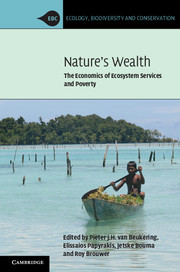Book contents
- Frontmatter
- Contents
- List of contributors
- Acknowledgements
- 1 The economics of ecosystem services and poverty
- Part I Biodiversity-related ecosystem services
- Part II Marine-related ecosystem services
- Part III Forest-related ecosystem services
- Part IV Water-related ecosystem services
- Part V Land-related ecosystem services
- 16 Income poverty and dependence on common resources in rural India
- 17 Tenure security and ecosystem service provisioning in Kenya
- 18 Pastureland degradation and poverty among herders in Mongolia
- 19 Changes in welfare and the environment in rural Uganda
- Index
- References
16 - Income poverty and dependence on common resources in rural India
Published online by Cambridge University Press: 05 July 2013
- Frontmatter
- Contents
- List of contributors
- Acknowledgements
- 1 The economics of ecosystem services and poverty
- Part I Biodiversity-related ecosystem services
- Part II Marine-related ecosystem services
- Part III Forest-related ecosystem services
- Part IV Water-related ecosystem services
- Part V Land-related ecosystem services
- 16 Income poverty and dependence on common resources in rural India
- 17 Tenure security and ecosystem service provisioning in Kenya
- 18 Pastureland degradation and poverty among herders in Mongolia
- 19 Changes in welfare and the environment in rural Uganda
- Index
- References
Summary
Introduction
Despite the recent rapid expansion of the IT software and services industry in India (which often draws widespread media attention in the West), the country still remains a predominantly agrarian economy. According to India’s 2001 census, more than 70% of the population lives in rural areas, and mostly in conditions of extreme poverty. The economy of these poor, rural households is closely connected to the village natural resource base – its forests, grazing lands and water resources. Whether households can make a living from agriculture depends, in large part, on the amount of water available for irrigation. The availability of fodder on village grazing lands affects the income that households derive from livestock rearing. The amount of fuelwood in village forests determines how much time households must devote to collecting fuelwood, and thereby also how much time remains for other income-generating activities.
Given the simultaneous existence of high levels of poverty and dependence on local common-pool resources, two questions arise: (1) can improved natural resource management form the basis of poverty alleviation policies in rural India; and (2) can common-pool resource stocks serve as a public asset for poor households, substituting for the private assets that they lack? Attempts to answer these questions have given rise to a growing literature on poverty–environment interactions (for reviews, see Barbier 2005, Duraiappah 1998, Horowitz 1998, Reardon and Vosti 1995).
- Type
- Chapter
- Information
- Nature's WealthThe Economics of Ecosystem Services and Poverty, pp. 341 - 355Publisher: Cambridge University PressPrint publication year: 2013



